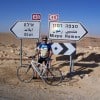Rabbi Lev Herrnson, 2014 Israel rider, explores his experience on the Israel Ride and his connection to the wilderness of Israel’s south.


Rabbi Lev Herrnson, 2014 Israel rider, explores his experience on the Israel Ride and his connection to the wilderness of Israel’s south.
Marcy Perlman Tardio rode on the 2014 Arava Institute & Hazon Israel Ride. She is a mother, grandmother, and homebirth midwife living in Brooklyn. This piece was originally published online at Haaretz.com on December 1st, 2014. Many within my multi-cultural circle of family and friends refused to support my participation in a charity bike ride in Israel, an ‘oppressor’ and ‘colonialist’ state. The year following my kidney transplant, over a decade ago, I rode in the Hazon charity bike ride in New York. I rode then to honor my older son, who had gifted me the kidney, and to celebrate my new-found health. Through the organizers I learned of a counterpart ride that took place in Israel; several weeks ago, I returned from the Hazon-Arava bike ride, where I completed 230 miles from Jerusalem to Eilat. Despite the challenges of the heat and the terrain, my most unexpected difficulty had emerged before I even sat in the saddle: Persuading my peers to donate to a charity effort that would take place in Israel. At the time of my first ride I had joined a synagogue. My younger son already attended Jewish day school. I, the daughter of culturally Jewish, left wing, secular […]
Rabbi Steve Golden reflects on his experience of riding on the 2014 Arava Institute & Hazon Israel Ride in memory of his friend, with inspiration from Israel and the Torah portion.

Jon Harris-Shapiro, two-time Israel rider, talks about going on the Israel Ride for an adventure and returning with that – and so much more. Jon will be on the 2014 Israel Ride in November.

Falynn Schmidt will be riding on her third Israel Ride in the fall. You can read this post and others on her blog “Baynim“ This year is auspicious, although I probably said that last year too. Last year my Gregorian calendar (May 26) and Hebrew calendar (Sivan 16) birthdays aligned, which only happens once every 19 years (auspicious, right?). I am announcing the auspiciousness again because this year is my last in this most memorable of decades. [1] I am not quite ready to head into the next 10 years, however I, please G/d, plan to use the next 12 months to prepare myself. To celebrate my birthday, I hope to do what I have done for the past three years, which is to ride my bicycle several hundred miles over the course of several days. It is this most childish of sports, indeed the only sport I learned to do in my childhood, that sustains my physical and mental health, makes me feel (and I dare say look) younger than my years, and gives me a grand goal of riding 400 miles. I will picture myself, wind in my pigtails, tush on a banana seat, turquoise tassles streaming from […]
The Arava Institute for Environmental Studies is the premier environmental academic and research program in the Middle East.
Friends of the Arava Institute
896 Beacon Street
Boston, MA 02215
info@friendsofarava.org | 617.266.7100
Please send all donation checks to the Friends of the Arava Institute.
Hazon means vision. We create healthier and more sustainable communities in the Jewish world and beyond.
Hazon
125 Maiden Lane, Suite 8B
New York, NY 10038
info@israelride.org | 212.644.2332 x302
Please contact Hazon with questions about the Israel Ride

